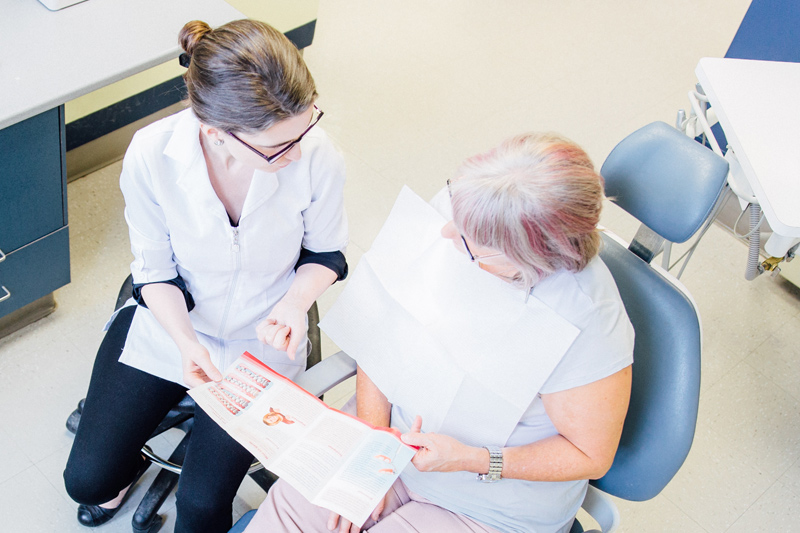How does the ODQ protect the public?
The Ordre des denturologistes du Québec has a complaints office and several committees to uphold service quality standards, process investigation requests and verify that its members have undergone proper training.

Complaints Office
The Complaints Office processes complaints and investigation requests. Should the Office have reason to believe allegations constitute a violation of regulations or laws governing the profession, the complainant will be presented with several possible avenues for conciliation.
In the absence of an agreement, the process resumes. The Complaints Office will record any further developments in its investigation report, within the time allotted by the Professional Code. After the investigation, the Office submits a decision in writing (to bring the complaint before the Disciplinary Board or not).
The Complaints Office also mediates disputes related to accounts.
The Complaints Office comprises a syndic, assistant syndics and corresponding syndics appointed by the Ordre’s Board of Directors.
Review Committee
At the request of a complainant, the Review Committee will re-examine charges determined by the Complaints Office to be unfounded.
The Committee must do one of the following:
- Conclude that there are no grounds to file a complaint with the Disciplinary Board
- Recommend the Complaints Office continue the investigation and submit a new decision about the need to file a complaint
- Find that a complaint should be filed with the Disciplinary Board, with an ad hoc syndic appointed to study the matter and submit a decision regarding a disciplinary hearing
Disciplinary Board
The Disciplinary Board receives complaints against professionals alleged to have violated of the Professional Code, the Denturologists Act or regulations governing the profession. The Board arbitrates requests made by the Complaints Office or by a third party, and handles complaints dismissed by the Complaints Office.
Pursuant Professional Code, offending professionals can be subject to one or more of the following sanctions for each offense:
- A reprimand
- Temporary or permanent striking from the roll of the Ordre, even if the professional is no longer on it
- A fine of no less than $2,500 nor more than $62,500
- The obligation to return funds that the professional is holding or should hold on behalf of any person to its rightful owner
- The obligation to transmit a document or any information in the document, and the obligation to complete, delete, update or rectify a document or information
- Revocation of the professional’s license
- Revocation of the professional’s specialist certificate
- Restriction or suspension of their right to engage in professional activities
For more information, refer to the website of the Office des professions (OPQ) [French only]: https://www.opq.gouv.qc.ca/droits-et-recours/recours-disciplinaires/
The Disciplinary Board is made up of a government-appointed president, as well as members and a secretary appointed by the Ordre’s Board of Directors.
Professional Inspection Committee
The Professional Inspection Committee monitors professional activities carried out by Ordre members. Workplace inspections cover files, books, registers, products, substances, machines and equipment used by the professional within the scope of their practice. The Committee also conducts professional competency inspections.
The Committee includes a president and members appointed by the Board of Directors.
Arbitration Council
The Arbitration Council hears testimony, receives evidence and hands down decisions regarding fees claimed by a professional. Council decisions are final and binding.
The three-member Council includes a president and a secretary appointed by the Ordre’s Board of Directors.
Unlawful Practice Committee
The Unlawful Practice Committee counters the illegal practice of prosthetic dentistry. The Committee process complaints submitted by the public, denturologists and other sources. It also carries out its own investigations to identify cases of fraudulent misrepresentation (practicing as a denturologist without appropriate accreditations and oversight), as such behaviour endangers public health.
The three-member Committee includes the Complaint Officer, and an assistant and secretary appointed by the Ordre’s Board of Directors.
Equivalencies Committee
The Equivalencies Committee processes diploma equivalency recognition requests and issues recommendations to the Board of Directors.
In the event that the Board of Directors rejects an equivalency request (in whole or in part), it must inform the applicant of any educational programs, complementary training, internships, or exams that can satisfy equivalency requirements.
Education Committee
The Education Committee is an advisory body tasked with examining issues surrounding denturologist training, while respecting the complementary and respective competencies of the Ordre, college-level educational institutions and the Ministère de l'Éducation et de l'Enseignement supérieur (MEES).
The skills proffered by legitimate training channels satisfy the requirements for practicing the profession of denturologist.
The Committee is made up of representatives from the Ordre, the Fédération des cégeps and the MEES.
Continuing Education Committee
The Continuing Education Committee oversees professional development and knowledge-building among denturologists, in keeping with the ever-evolving art and science of prosthetic dentistry.
The Ordre has established a three-year continuing education program for denturologists, worth 30 continuing education units (CEU). The program includes lectures and conferences (both on-site and online) and instructive articles.
The Centre international de recherche et d’éducation en denturologie (CIRED) has partnered with the Ordre.
The Committee comprises Ordre members, one of whom is the Committee head.
